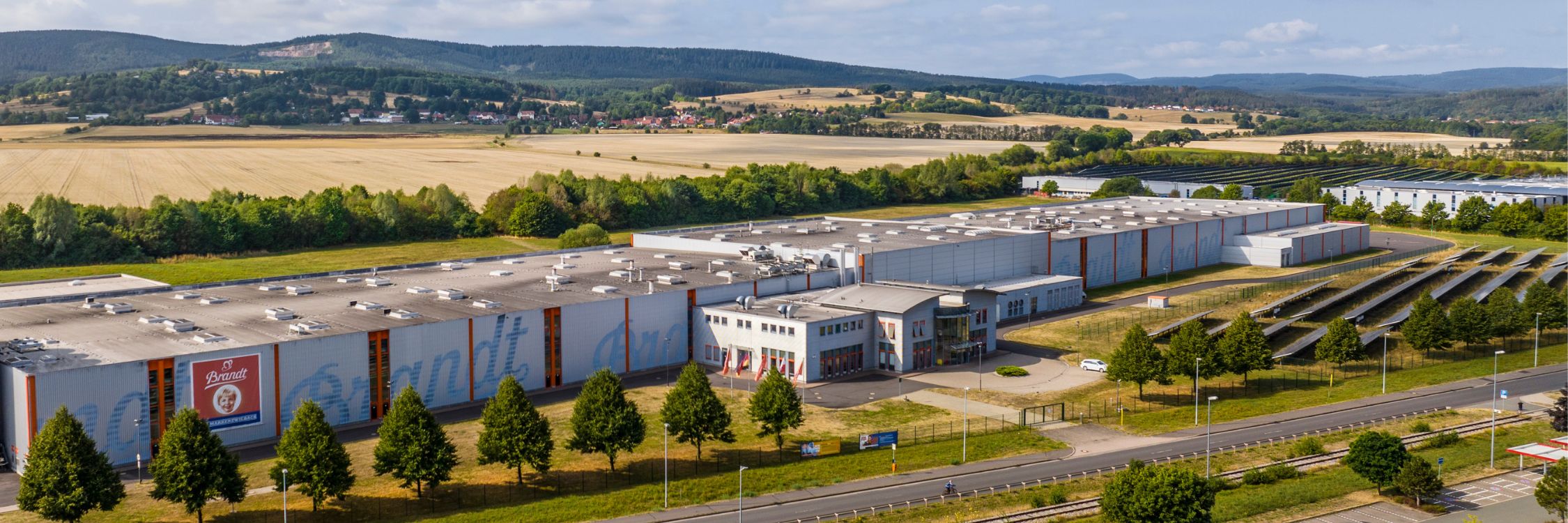Sustainability & Commitment
To German version / Zur deutschen Version »
It is our aim to achieve a sustainable economic management and therefore we take our responsibility for quality, ecology, economics and social commitment very seriously. Sustainability and social responsibility are important guidelines for our actions. In order to contribute to a world worth living in, we do as a matter of course not only want to comply with all existing German rights and obligations, but furthermore to set new standards. To develop according sustainability concepts and standards, we cooperate closely with the “Zentrum für nachhaltige Unternehmensführung” (ZNU = Centre for Sustainable Corporate Management) of the University of Witten-Herdecke (Germany) and other partners. For our production site in Ohrdruf / Thuringia we have prepared an economic climate balance and calculated the so-called CO2-footprint for our brand rusk “Zwieback”. The CO2-footprint of a product provides the information how much CO2is being generated during the production process. We also require high standards, when it comes to our raw materials. The wheat meal for our Zwieback originates solely from integrated, monitored German contract cultivation, which means in effect that producers undertake to minimise the use of fertilisers as well as to use eco-friendly crop protection products. Furthermore we only use egg products of hens in cage-free management systems. Regarding the reduction of CO2 emissions, we also take particular care to ensure that our main raw material wheat takes the shortest way possible from the mill to our production premises.
Lowering energy consumption also plays an important role in our corporate policy. We are all too well aware that our production and operations affect the energy balance, therefore it is our obligation to reduce the use of energy in the frame of economic and technical possibilities to a possible minimum Our responsibility handling the economical use of energy requires the quality assessment and evaluation in terms of energy and environment, fulfilling the energy objectives as defined as well as its verification process with measurable criteria. To meet all these requirements, we installed an energy management system and we have had ISO 50001 certification since 2015.
Since summer 2017, Brandt has used sunflower vegetable oil made from High Oleic sunflowers for the dough production of most rusk Zwieback specialities instead of the certified palm oil used before. This special sunflower oil contains a particularly high content of unsaturated fatty acids and complies with the recommendations of the German Nutrition Society (DGE) Code. Furthermore it is particularly heat resistant and suitable for baking at high temperatures as it is necessary for producing Zwieback. Only at preparing our enhanced rusk specialities coated with a glaze and very few other products, we are still searching for a practicable solution without the need for palm oil/palm kernel oil. Of course, the palm oil/palm kernel oil used in these products originates still from RSPO certified sources, and since 2011 we have supported towards the sustainable cultivation of oil palms through our membership in the RSPO (Round Table on Sustainable Palm Oil).
Since 2018 we have used solely cocoa and chocolate certified by the “UTZ MB Certified Cocoa Programme” in all our rusks. All large and small Brandt rusk products with cocoa, whole milk and dark chocolate carry the UTZ label. UTZ is a sustainability program for coffee, cocoa and tea in which many renowned companies are involved. The programme enables farmers to optimize their productivity, product quality and efficiency with respect towards mankind and the environment. It allows them to produce larger quantities at lower costs, thereby improving the living standards of the farming communities.
Users may enjoy their favourite brands and are able to contribute to a more sustainable world.
» more about the UTZ sustainability program
We have started to integrate this sustainable and considerate thinking systematically into the entire organization (departments and processes). With this system we would also like to take everybody with a direct or indirect relationship or interest in our company a shared path into a better future.
Moreover we would like to inform you about our sustainability goals for the Zwieback plant in Ohrdruf:
1. Promoting compatibility of family and working life
As a family enterprise rich in tradition, we take particular concern in our employees. It is our staff who are of vital importance for our success and our growth. Hence it has been our great concern and our obligation to actively promote and further develop the work-life balance of our employees. To ensure an optimal realization, it is essential to us among other things to pursue a family-friendly human resources policy as well as to promote an active health management.
Compared to 2017/2018 we were able to further reduce the sickness rate by 0.7%.
2. Succession – Knowledge Management
Due to the demographic change both in Germany and in the rest of Europe, the human resource and succession management instrument has become of increasing significance. The succession management also counteracts the lack of skilled labour by its systematic approach.
This development has been also identified as a development priority as the retirement of many key owners of knowledge is foreseeable. Our company is implementing a scheduled operation to transmit their knowledge to their successors. Parallel to these activities, the developed knowledge management is being applied in the profound education of our trainees.
To guarantee the process of succession, we have initiated 18 trainees in Ohrdruf to complete their apprenticeship in 2018 to 2020 and the following employment of these new skilled workers. The training at the Ohrdruf location is supported and encouraged by six qualified instructors.
3. Saving of 350,000 tons of CO2 per year
In the beginning of 2018, Brandt set up and put into service a ground-mounted photovoltaic plant at the Ohrdruf site. It is planned to generate 750.000 kWh electricity per year and therefore to reduce the external electricity supply. In so doing, the solar-powered facility will cover more than 12% of the total electricity consumption.
The highest energy consumption stems from cooling during the production process. The greatest energy consumption particularly occurs especially in the summer season. Therefore a photovoltaic plant for direct use is the optimal solution and we want to save approx. 350 tonnes CO2 per year (applied CO2-equivalent in 2016: 488 g/kWh) – this means almost a ton saving per day. In addition to the former investments in energy-saving projects in our whole plant, the Brandt Company has continued her sustainable investment policy with the implementation of the new photovoltaic plant.
The first results for 2018 are already available: in the first 12 months of operation, we have already saved approx. 400 tonnes CO2.
We at Brandt would like to assure you that we constantly take the issue of sustainability as well as the realisation of our goals very seriously indeed.
So we are delighted to have been able to support the project by „Clowns helfen e.V.“ (“Clinic Clowns”) by a donation (see picture above) and we have still proceeded this commitment continuously across different activities to the present day.

